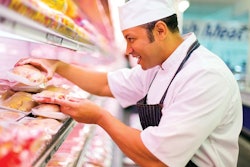
Morgaine Gaye, a food futurologist whose clients include Mars, Unilever, Nestle, Amazon and more, evaluates how economics, geopolitics and even culture and traditions shape consumer behaviors and habits when it comes to food purchases.
“When we look at food, it’s not in a vacuum,” she explained. “I’m a food futurologist, but I have to look at everything else as well.”
Here are some of the consumer trends Gaye is most excited about:
1 How consumers think about food is dramatically changing
The world is currently undergoing seismic shifts. Some of those changes are in response to the COVID-19 pandemic. Others are due to changes in global power or where the next tech hub is emerging.
“The next three to five years are going to be cataclysmic. I can see our whole value system changing the way we shop and buy food,” Gaye said.
This includes where consumers buy food, as well as a move toward more personalized diets based on someone’s microbiome or DNA.
2. Innovations in artificial proteins
The artificial protein market will continue to see innovation and expansion in the next several years. Gaye is particularly interested in air proteins, calling it “such a disruptor” because of it’s ability to “turn things around in terms of the supply chain.
Like the process used to manufacture cultivated meat, air proteins are created in fermentation tanks using CO2, nitrogen and oxygen. Advocates say the resulting product is high in protein, vitamins, minerals and nutrients, with a lower environmental impact than traditional agriculture.
3. Consumers are looking to reconnect
While concerns about the environment are nothing new, COVID-19 left many consumers with a renewed desire to reconnect with the world around them.
“This was the very first time people were very much confronted with themselves and their lack of connection with everything else and it sparked a reconnection with the environment,” she said.
In addition, younger consumers, namely Generation Z, tend to place a high value on the environment. This, along with a dedication to doing things differently than the generations before it, mean that this demographic will have a major impact on how poultry is raised, fed, processed and marketed.
4. Kindness will be the new commodity
I’ve written several times about how the definition of sustainability is broadening. Once only associated with the environment, the term now also encompasses animal welfare, social issues and more.
These ideals all factor into the fact that kindness has become a commodity when it comes to consumers.
“Once upon a time, we might have just thought that kindness was something we thought about in relation to other people,” said Gaye. “But kindness to everything and the whole chain of events now matters – whether that’s to our planet, to our employees, to our colleagues and to ourselves.”















